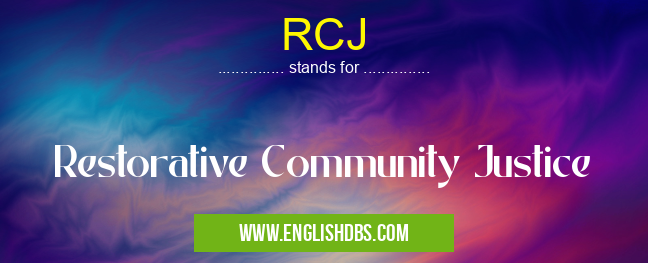What does RCJ mean in LAW & LEGAL
RCJ stands for Restorative Community Justice, a reform in the governmental justice system that seeks to bring offenders and victims into dialogue and engagement with each other. It emphasizes rehabilitation and reparation for offenders through dialogue, accountability and constructive problem solving. As an alternative to traditional punitive approaches, this approach involves the whole community in creating a safe space for those affected by crime to heal, repair relationships and build trust. RCJ provides an opportunity for communities to become more involved in addressing crime and its consequences in their own neighborhoods.

RCJ meaning in Law & Legal in Governmental
RCJ mostly used in an acronym Law & Legal in Category Governmental that means Restorative Community Justice
Shorthand: RCJ,
Full Form: Restorative Community Justice
For more information of "Restorative Community Justice", see the section below.
Advantages of RCJ
The advantages of Restorative Community Justice include its emphasis on repairing harm caused by offending behaviour while avoiding unnecessary or harsh punishments which do not address underlying issues that fuel reoffending such as poverty or mental illness. Advocates claim these practices may encourage personal responsibility among offending populations, allowing them to take ownership of what happened within their communities while still being held accountable for their actions without overly punitive measures such as incarceration or fines which often lead to further financial hardship or alienation from society as a whole. Furthermore this approach can result in significant cost savings compared to other forms of sentencing due to reduced reliance on costly legal measures such as prosecution & imprisonment
Essential Questions and Answers on Restorative Community Justice in "GOVERNMENTAL»LAW"
What is Restorative Community Justice?
Restorative Community Justice (RCJ) is a form of community-based criminal justice that attempts to repair the harm caused by crimes. It is an alternative to traditional retribution-based models of criminal justice, and seeks to reduce the rates of recidivism by addressing the underlying causes of criminal behavior and promoting community healing.
What are the goals of RCJ?
The primary goal of Restorative Community Justice is to restore individuals who have been affected by crime -- including victims, offenders, and communities -- through dialogue and collaboration. It also seeks to foster respect among all members of society while preventing future offenses from occurring.
How does Restorative Community Justice work?
Restorative Community Justice typically involves circles or meetings in which victims, offenders, family members, friends, and/or community members come together with the goal of repairing the harm caused by a crime. These meetings typically involve structured dialogue between participants in order to explore feelings and opinions, examine accountability for wrongs committed, apologize for any wrongs done, make restitution where possible, develop strategies for preventing similar conflicts from occurring in the future, and commit to engaging in meaningful actions that promote healing.
Who participates in RCJ?
Restorative Community Justice meetings typically involve victims, offenders, their families or support networks (e.g., mentors), friends or other members of the community who are affected by the crime. In some cases, law enforcement officers may also be invited to participate in these meetings.
What happens after a restorative justice meeting?
After a restorative justice meeting has taken place between participants involved in a conflict situation that has resulted from criminal behavior, participants usually leave with an agreement about how they plan on taking action going forward that will help repair any harm done. This may include agreeing on reparations such as payment for damages incurred by victims or service projects that benefit both parties as well as their communities at large.
Is RCJ effective?
Studies have found that restorative justice programs can lead to lower recidivism rates among offenders while increasing victim satisfaction with outcomes compared to traditional criminal justice proceedings like incarceration or fines. Participating in RCJ has also been found to have positive psychological benefits for those involved; it can provide an opportunity for emotional growth and understanding beyond what could have been achieved via traditional prosecutorial means alone.
How can I become involved with Restorative Community Justice initiatives?
If you’re interested in getting involved with local Restorative Community Justice initiatives there are several ways you can do so dependent upon your location and resources available. You can research current initiatives within your area online or contact local government offices directly who may be able to connect you with relevant organizations working with RCJ programs.
